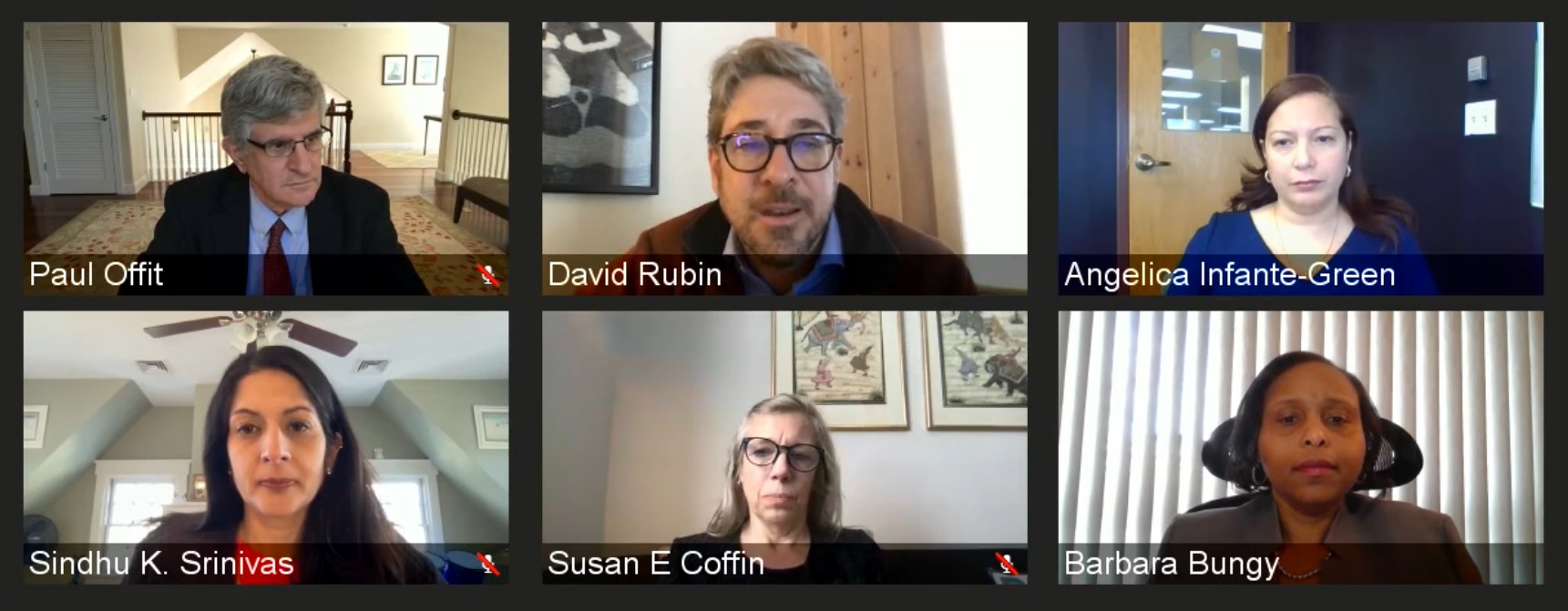
Done right, the prospects for conducting in-person instruction safely for the rest of the 2020-21 school year are bright, six experts in education and health said Friday.
Yes, Covid-19 case counts remain far too high, and there are concerns about new, more contagious variants of the virus, said Dr. David Rubin, director of PolicyLab at the Children's Hospital of Philadelphia, known as CHOP.
Related: Superintendents weigh next Covid-19 moves with physicians' input
But school districts, hospitals and governments are armed with new tools, he said, including vaccines and rapid, inexpensive antigen tests, and they have a trove of real-world data on ways to curb the spread of coronavirus effectively.
With the right practices, schools can be "little islands of safety," and can even keep transmission levels below those of the surrounding community, said Dr. Susan Coffin, professor of pediatrics at the University of Pennsylvania School of Medicine and an attending physician at CHOP.
In Rhode Island, Covid-19 case rates are lower in schools than among remote learners, said Angelica Infante-Green, the state's the commissioner of elementary and secondary education. About 95% of the state's K-12 education is conducted in person, she said.
Halfway to June
Rubin, Coffin and Infante-Green made their comments during a webinar sponsored by PolicyLab on "Navigating the Remainder of the Covid-19 School Year." Rubin moderated; he was joined by Coffin and four other panelists. (PolicyLab plans to post the archived video on Monday.)
The webinar drew more than 600 participants. Among them were teachers and administrators from school districts with little or no in-person instruction. Districts' approaches to Covid-19 have varied widely: When Philadelphia's public schools proposed returning to in-person education, about two-thirds of families opted to stick with remote learning, Rubin said.
In Lancaster County, though several districts shifted online over the holidays, all have returned to in-person instruction, with the exception of the School District of Lancaster, which will begin reverting on Monday, with about 75% of students returning to school grounds.
Districts are making online options available for families who want them, and administrators have from time to time chosen to close buildings temporarily in response to outbreaks.
Here are five takeaways from PolicyLab's event.
1. When it comes to mitigation, think in 'layers'
Masks, social distancing, air filtration, cleaning programs: Infante-Green characterized Rhode Island's strategy as "layer upon layer upon layer." Throw everything into the mix, she advised: "The more boxes you can check off, the safer the environment is."
Having a safety plan with more components gives you more flexibility when you have to make tradeoffs, she said. She stressed the importance of bringing teachers and staff into the conversation: They're the ones who have to make it work, and they can bring up questions and issues that wouldn't occur to those not involved in the day-to-day work.
2. Think outside the school
School is only one aspect of students lives: What exposure risks might they run at home, in their neighborhood, or playing sports? Schools and families have to work together, Infante-Green said.
Dr. Sindhu Srinivas is director of obstetrics at the Hospital of the University of Pennsylvania. She discussed guiding families through choices about child care, and getting them to think about it in context, factoring in their potential exposure at work and in the community.
Sports have been a challenge, Infante-Green said: Masking is harder, and interscholastic events bring young people from different areas into close contact.
Still, by and large, "kids have not been the problem," she said: Rhode Island's Covid-19 spread has been primarily community-driven.
3. The vaccine works
The evidence indicates that the Pfizer and Moderna mRNA vaccines are safe and effective, and indeed remarkably so, said Dr. Paul Offit, director of CHOP's Vaccine Education Center.
The vaccine appears to work against the U.K. Covid-19 variant, he said. There is less data on two other variants, but no clear evidence that they're beyond the vaccine's reach. Viral mutation is a fact of life, he said, but he predicted Covid-19 will be more like the measles, for which the vaccine developed in the 1960s remains effective, than than the flu, which requires a fresh formulation annually.
Offit predicted a vaccine would be cleared for use in children by summer. It makes sense to vaccinate children, he said: While Covid-19 wreaks the most damage among the elderly, the risk to children isn't negligible, and inoculating them can help in building herd immunity.
4. Test, test, test
Coffin said rapid, inexpensive antigen tests, which can give schools a diagnostic result within 15 minutes are an "incredibly powerful" tool. With them, schools can assess quickly whether someone's cough is due to Covid-19 or just a cold; they can also monitor asymptomatic populations for hidden infections and catch them before they spread.
While PCR tests are considered the gold standard, antigen tests are more accurate than people may realize. Rhode Island ran a pilot program that administered both kinds of test: the PCR test caught only one case that the antigen test missed, Infante-Green said.
5. Communication is key
The panelists were emphatic about the importance of communication. To get buy-in, you have to earn people's trust and make them partners in the conversation, said Barbara Bungy, deputy director of Education Plus Health, a Philadelphia nonprofit.
She and the others agreed that sensitivity in outreach efforts and building trust are especially important with communities of color, which have suffered from abuse at the hands of the medical establishment — a point made recently by local doctors in Lancaster, too.
"We all want to be heard, understood," Bungy said. We want to feel valued. Be valued."





